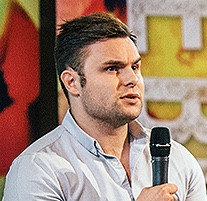
In our globalised economy, financial markets across the world have seen unparalleled volatility in recent years.
Whilst volatility has always created the margin needed for opportunity, when we struggle to find any source of stability it can be hard to feel secure about the nature of our long-term projects and the direction of our lives overall.
When it comes to our work and careers, we need a sense of purpose which gives foundation and an anchor when the challenges and headwinds of life set in.
If we fail to correctly establish what the greater goal of all our efforts is or should be, the by-products of work usurp and become our goal. So instead of shooting for something greater, we shoot for something less and end up in a place we never wanted to be. It can happen without our even noticing.
Do you need to step back and ask: Where is life to be found? Where is its enduring significance?
Striving for stability
The question about purpose comes down to what we choose to place in that position of “chief good” – to borrow the ancient Greek philosopher Aristotle’s famously articulated phrase in “Nicomachean Ethics”:
Either the chief good is material, or the chief good is moral. Which is ultimate?
“Every sort of knowledge and enquiry and every action and undertaking seems to seek some good … If there is some end in all our work that we wish for because of itself, wishing for all the other things we wish for because of it alone – this will the chief good. In life, if we could know it, it would have great significance – like archers with a target we would be so much more successful in hitting the point if we had this knowledge. We must try to grasp what this good might be.”
In the history of ideas there have only been two categories of answer on offer about life’s purpose: Either the chief good is material, or the chief good is moral. Which should we regard as ultimate?
Material vs moral
Ideas from ancient Greece, which have characterised much of intellectual life for centuries, believe the chief good is material because the sum total of reality is the physical universe and there is nothing more. This is what Aristotle ended up concluding.
The challenge with this conclusion is what it would really mean for human identity.
In the history of ideas, the train of thought from Athens was going along very nicely – until the claim in 33AD that a man called Jesus Christ had been raised from the dead, three days after being crucified by the Roman army in Jerusalem. Jesus had said publicly that His death would restore humanity’s relationship with God.
What was interesting about Jesus was His insistence that the true purpose for humanity was moral: “Seek first the Kingdom of God and His righteousness all the rest will be added on to you.” (Matthew 6:33)
“Material goods are just good images of what we really desire; if they are mistaken for the thing itself they turn into dumb idols.”
“Righteousness” means being right with God and in relationship with Him. This is the moral account of the chief good at the heart of the second category of answers about human purpose.
The idea started by Jesus was that we should take relationship with God and moral standing with Him as the primary aim in life and the rest would work itself out in hierarchy under that. The chief good for humanity was not material but moral.
There is nothing inherently wrong with material things, but as author CS Lewis said, they are just “good images of what we really desire; if they are mistaken for the thing itself they turn into dumb idols, breaking the hearts of their worshippers.
“For they are not the thing itself; they are only the scent of a flower we have not found, the echo of a tune we have not heard, news from a country we have never yet visited.”
So our ultimate aims in life can either be material or moral.
Life’s purpose
With demanding jobs, families to provide for, mortgages to pay, mouths to feed, we know very well how easy it can be to focus just on the material. It’s because the material is so tangible – material goals and rewards are right there – and God can seem so far away.
For many, even the idea of God being there and of Him caring about your life is deeply problematic – intellectually, emotionally, experientially.
But to find our purpose, we must ask: What we are really here for?
Could it be that God really loves me? And, looking at the Cross of Jesus Christ, is there any evidence of His love for us, and a basis upon which we could trust Him with our lives?
In a world where it is hard at times to know what is worth living for, we see the love of God in Christ deeming us worth dying for.
Sometimes life gives us a reality check and we can see we’ve had our value system in the wrong order and that relationship with God has not been a priority. But no matter where we’ve got to in life or what we’re living for at the present moment, relationship with God is available to each and every one of us.
Is a relationship with God something you have today?
Jesus Christ came into this world so that one category of answers about life’s purpose could find its full and proper meaning in the higher one. The Son of God took on flesh so that the material could be redeemed by the moral – and so that through Him, we are able to have the right standing before God we were made for and thereby find that with the chief good back in its place, life takes on a new and better meaning.
In a world where it is hard at times to know what is worth living for, we see the love of God in Christ deeming us worth dying for. Are you trusting him with your life today?
We are an independent, non-profit organisation that relies on the generosity of our readers, such as yourself, to continue serving the kingdom. Every dollar donated goes directly back into our editorial coverage.
Would you consider partnering with us in our kingdom work by supporting us financially, either as a one-off donation, or a recurring pledge?
Support Salt&Light



